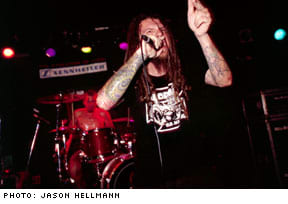"I would say it is a continuation, not a rebirth," says guitarist Matt Easley both on Bloodlet's return from the land of the hiatus, and of their latest opus, Three Humid Nights in The Cypress Trees. "But it's not going to make sense to anyone but the band." Formed in 1992, Bloodlet played a major role in the resurgent mid-'90s hardcore scene, which has since expanded exponentially. While many of their Victory Records brethren were purveying hardcore punk with thrash riffs and straightedge lyrics, Bloodlet chose the path less travelled. Focusing on plying an unorthodox, deliberate and ominous combination of biting metal influences that were as abrasive and punishing as they were intelligent, artistic and malevolent, Bloodlet would lead the way for the more "metal" than "hardcore" bands in the hardcore underground.
But in 1998, at the height of their popularity and on the cusp of crossing over to the metal underground through tours with Entombed and Neurosis, Bloodlet unexpectedly vanished. No goodbye, no farewell tour, just rumours and a question mark in their legacy. "It wasn't ever discussed," comments Matt on the unexpected split, "but when we went our separate ways, we weren't sure what was going to happen. We had been spending a lot of time together, touring extensively for four years, and we were frustrated and needed a break. On tour you neglect a lot of other parts of life. When you get back, you're kind of shell-shocked."
While many in the hardcore underground are currently reviving careers in an attempt to cash in on past notoriety, sounding like shells of their former selves in the process, what led to Bloodlet's return after a four-year absence is genuine love. And considering the core line-up of Easley, vocalist Scott Angelacos and bassist Art Legere remains intact (completed by new drummer John Stewart Jr.), and the fact that they've managed to recapture their greatness with their return full-length, it is indeed a continuation of their thread, rather than a cash grab.
"Time heals all wounds and the music is in our blood," Matt says. "If we weren't on tour right now, we would be at home paying for a warehouse and playing, because it is just something we do. None of us stopped playing, we just stopped performing." However, while Three Humid Nights In The Cypress Trees is a dramatic scream to the whisper that was their disappearance, things have changed, as it incorporates almost equal amounts of singing with the trademarked sepulchral bellow, along with a host of new influences, such as blues and Southern doom, rock and faster tempos. Which begs the question, while this is a Bloodlet album, could Bloodlet have made this album four years ago? "It's hard for me to say," ponders Easley. "I think we could have made a really good album, but it wouldn't have been this one."
But in 1998, at the height of their popularity and on the cusp of crossing over to the metal underground through tours with Entombed and Neurosis, Bloodlet unexpectedly vanished. No goodbye, no farewell tour, just rumours and a question mark in their legacy. "It wasn't ever discussed," comments Matt on the unexpected split, "but when we went our separate ways, we weren't sure what was going to happen. We had been spending a lot of time together, touring extensively for four years, and we were frustrated and needed a break. On tour you neglect a lot of other parts of life. When you get back, you're kind of shell-shocked."
While many in the hardcore underground are currently reviving careers in an attempt to cash in on past notoriety, sounding like shells of their former selves in the process, what led to Bloodlet's return after a four-year absence is genuine love. And considering the core line-up of Easley, vocalist Scott Angelacos and bassist Art Legere remains intact (completed by new drummer John Stewart Jr.), and the fact that they've managed to recapture their greatness with their return full-length, it is indeed a continuation of their thread, rather than a cash grab.
"Time heals all wounds and the music is in our blood," Matt says. "If we weren't on tour right now, we would be at home paying for a warehouse and playing, because it is just something we do. None of us stopped playing, we just stopped performing." However, while Three Humid Nights In The Cypress Trees is a dramatic scream to the whisper that was their disappearance, things have changed, as it incorporates almost equal amounts of singing with the trademarked sepulchral bellow, along with a host of new influences, such as blues and Southern doom, rock and faster tempos. Which begs the question, while this is a Bloodlet album, could Bloodlet have made this album four years ago? "It's hard for me to say," ponders Easley. "I think we could have made a really good album, but it wouldn't have been this one."
